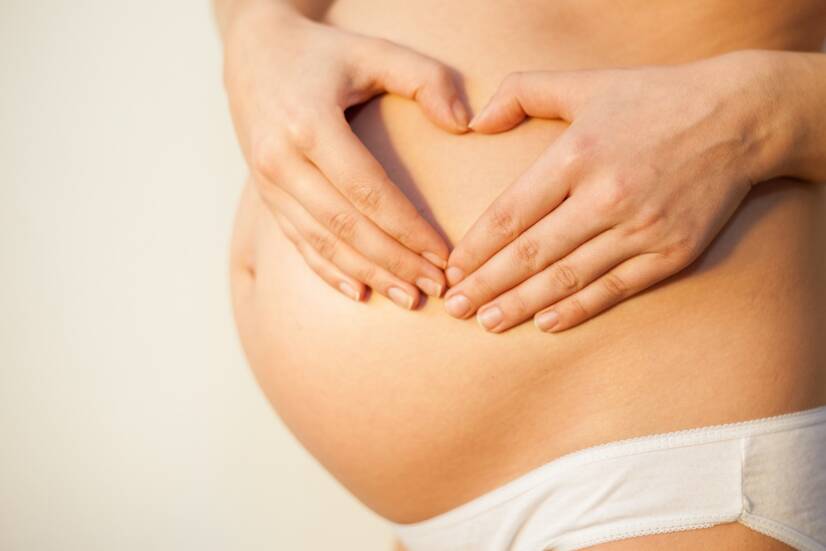- Modern Obstetrics: 2nd, revised and updated edition - Roztočil Aleš, kolektiv
- mayoclinic.org - Pregnancy week by week
- whattoexpect.com - 29 Weeks Pregnant
- babycenter.com - 29 weeks pregnant
29th week of pregnancy: what awaits you? The first smile in the tummy

You're already in your 29th week of pregnancy. The time is flying by so fast and you're 11 weeks away from your due date. Let's read how this week of pregnancy is going and how your baby is developing.
Article content
Your tummy is rounding and growing. What is this growth in your pregnancy tummy?
Your baby is getting stronger and more responsive to your different movements, to sounds, voices and to light. Watch every movement and roll of the baby in your tummy during the day. When he is awake, count whether he has moved at least 10 times in two hours. This will make sure that everything is okay.
How is your baby developing in your tummy?
Your baby is slowly approaching its birth length. It will have more than doubled its weight by the end of the 40th week. Its fat is spread over 3% of its weight. It is now about 38 cm long and weighs 1150 g.
His skin, which was red and wrinkled, is beginning to smooth out by gaining weight and filling in with fat. The lanugo, the fine hair that covered his entire body, will slowly start to fall out from this week onwards.
His eyelids are open and he is able to see partially even when it is dark in the womb. A certain amount of light passes through the skin and the womb to him.
The lungs are slowly maturing but still lack surfactant, an active substance that reduces surface tension on the alveoli. It is needed to prevent the lungs from collapsing when the baby exhales.
Premature babies are given a natural surfactant that penetrates the immature lungs and prevents them from sticking together.
Brain and muscle development continues. The brain is developed to the point where independent fetal thermoregulation begins.
It is recommended to add omega-3 fatty acids for proper brain development.
The facial nerve endings are ready to suck. Because of the constant swallowing of amniotic fluid, he may hiccup more often, so you will get regular, gentle belly lifts. He will drink and urinate approximately half a litre of amniotic fluid during the day.
By this week, your baby can already conjure up her first smile, especially in her sleep. Which is already admirable. A few weeks ago, she was just a clump of cells. Now she's grown in size and weight and can already conjure up a sweet smile.
His bone tissue is getting bigger. Up to 250 grams of calcium a week is being stored in his bones to make them stronger.
The table shows the approximate measurements of the fetus at 29 weeks, taken with a sonographer
| Total length | Weight | HC Head circumference | BPD Transverse head diameter | AC Abdominal circumference | FL Femur length |
| 38.6 cm | 1150 g | 269.6 mm | 76.3 mm | 243,6 mm | 53,4 mm |
You can read more about fetal size in the article:
Ultrasound in pregnancy: fetal size, what is fetal biometry?
How does a woman feel at 29 weeks of pregnancy?
Fatigue still persists. Every activity you do makes you tired. However, you are carrying a few extra kilos and your body has to exert more effort. In addition, pregnancy insomnia comes into play, which can also bother you.
At night, you probably wake up more often because of the growing tummy. The naughty baby often decides that it doesn't want to sleep. It won't let you sleep either, as it still has to complete its somersaults, which are sometimes more painful.
The growing tummy and its pressure on the bladder makes you have to go to the toilet every now and then. At night, you may also be woken up by cramps in your legs.
The growing tummy puts pressure on your pelvic veins, which constricts the blood flow to your legs. As a consequence, your legs cramp, swell and develop unpleasant haemorrhoids. Try to avoid standing or sitting for long periods of time.
You may also suffer from constipation, which increases the risk of haemorrhoids, so increase your fibre intake and keep up your drinking regime. Yoghurts with probiotic cultures are also very good. As for digestive problems, you may also suffer from heartburn or indigestion.
All internal organs are slightly displaced and compressed by the growing uterus.
Climbing stairs or walking faster can cause rapid shortness of breath and make you feel like a small locomotive. Difficulty breathing is also not uncommon.
Migraines can also plague you. If you have already developed headaches, rest in a dark quiet room and a cold compress on your neck or forehead is recommended.
What can you notice?
Do you feel a lull in your thinking?
Yes, it is possible.
Hormones during pregnancy sometimes cause confusion and decreased memory, especially during the third trimester.
Your fingernails grow faster, which makes you happy, but they're more brittle again.
You may start to leak colostrum, which you'll notice with a small spot on your bra. If you've already noticed this, just make sure you get breast pads to protect you from unwanted spots on your bra or t-shirt.
Restless legs syndrome can also occur in the third trimester.
Your skin may also be more sensitive to the sun, heat or cleaning products.
Many studies show that during pregnancy, feet can lengthen or widen. This remains even after childbirth. So you may need to wear bigger shoes by a half to a full size after pregnancy.
During the last trimester, beware of the urinary tract, which is more prone to infections. It may be accompanied by an unpleasant burning sensation when urinating. Urine tends to be cloudy, dark or bloody, which needs to be treated.
Examination in the consultation room
During each consultation, your urine is examined, blood pressure, pulse, weight gain, and the appearance of swelling in the lower limbs are monitored. The doctor examines the size of the uterus and the condition of the cervix.
During a sonographic (ultrasound) examination, he or she monitors the fetus and its heart sounds, which should be around 110-150 pulses per minute.
The doctor asks you: how often and how intense you feel the movements,
whether your abdomen is starting to harden,
how often and how long it lasts.
What can we recommend?
Try to rest more and unload your legs on a pillow when resting to prevent varicose veins and swelling in your legs. Your leg veins may become enlarged. During pregnancy, your blood volume increases and the growing uterus presses on your pelvic veins, which can also cause you to develop hemorrhoids.
The only way to avoid this is to avoid sitting and standing for long periods of time.
Try to get at least a little exercise every day, and walking won't do you any harm. Wear comfortable shoes so you don't put unnecessary strain on your feet.
Try to rest during the day, go to bed and get up at the same time.
Eat a healthy and nutritious diet containing iron and calcium. Increase your intake of milk, yoghurt, cheese. Treat yourself to exercise during the day, go for walks. If you have small children at home, don't be shy to ask family or loved ones to help you with them and keep them occupied for at least a little while during the day until you get some rest.
Avoid caffeine. It is recommended to add omega-3 fatty acids.
Start strengthening your pelvic floor with Kegel exercises.
Have you started thinking about cord blood collection? Read about this option and think about it, you still have a little time.
Read more about the other weeks of pregnancy in the summary article:
Pregnancyby weeks: How does pregnancy and fetal development work?
Interesting resources
Related










